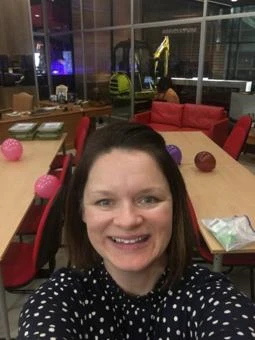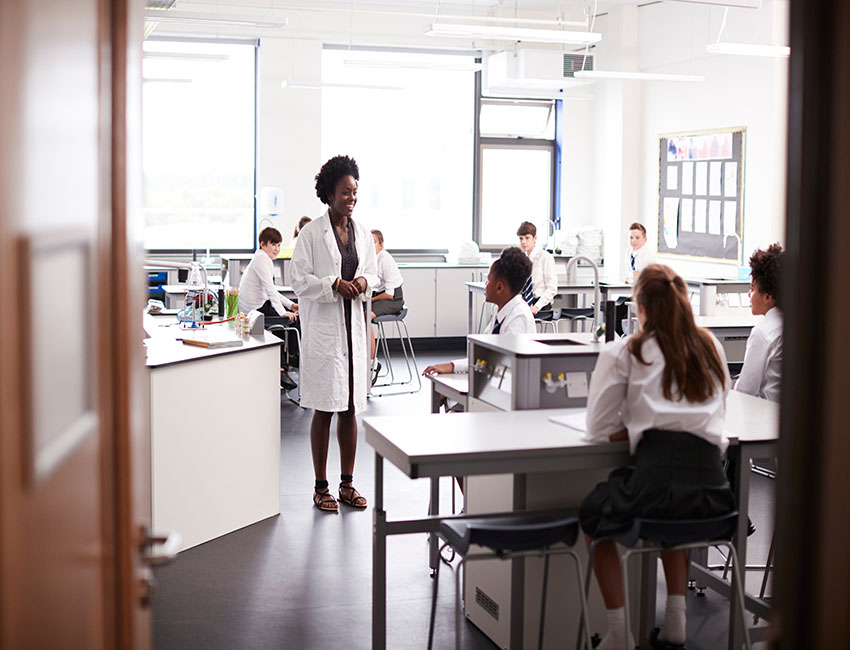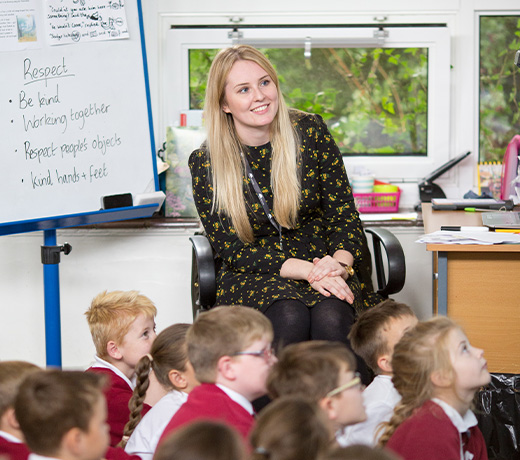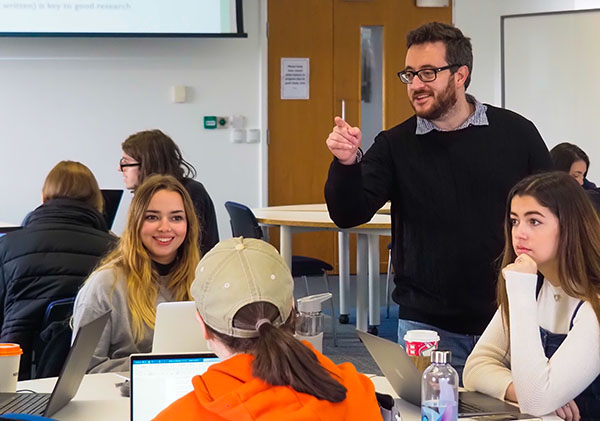We have an excellent reputation with schools in the region and have been training highly skilled, inspirational secondary teachers for over 75 years.
in the UK for Quality Education
Training bursary available for this subject*
We’ve been rated as ‘Outstanding’ in training primary and secondary teachers, the highest possible grade a provider can receive.
First for jobs
The University of Worcester is first in the UK for sustained employment, further study or both, five years after graduation (excluding specialist institutions) - Longitudinal Educational Outcomes Survey 2024. Read more.
Overview
Our postgraduate certificate in education (PGCE) will prepare you to become an inspirational chemistry teacher with varied school placements, interactive lesson simulations and tailored tutor support.
At Worcester, you’ll gain experience through placement in two different secondary school environments, teaching a range of secondary year groups, whilst receiving support from a subject mentor and University tutors.
When not on placement, you’ll be taught through a mixture of lectures, workshops and interactive subject sessions. During these interactive sessions, our tutors will model effective teaching and classroom management strategies in our science labs. You’ll also get the opportunity to select one of our enhancement activities, these allow you to pursue a subject that's important to you – from Special Educational Needs and Disabilities (SEND) to climate change.
Beyond the classroom, we’ll enrich your subject knowledge based on the chemistry curriculum. You'll develop your digital technology skills for data logging and learn how plan for pupil safety during investigations. You'll also receive professional support from The Royal Society of Chemistry and in some cases a scholarship, as Worcester is an RSC 'Learn Chemistry Partnership Advocate'.
When you successfully complete the course, you’ll be recommended for Qualified Teacher Status (QTS), this means you will be recognised by the Teaching Regulation Agency as a fully qualified teacher.
Placements
You’ll complete a minimum of 120 days of placement, teaching chemistry in two different schools, so you can experience a wide range of age groups and learning environments. There will also be additional school visit days where you can explore practical strategies for the classroom, with opportunities to practice, rehearse and then implement in school.
We have a strong relationship with over 100 partnership schools, where you will be supported by subject specialist mentors. School mentors are experienced teachers who we work with to make sure you get the highest quality, placement experience.
Regional Training Hubs
You can apply to study a PGCE directly with the University or with one of our partner Regional Training Hubs.
These Regional Training Hubs are networks of schools working together to train teachers. When you apply through a hub you will do a mix of training at their sites and at the University, and the hub will organise your placements within their network of schools.
"Trainees benefit from an exceptional learning experience at the University of Worcester. This experience instils in them a deep-rooted commitment to making a difference to the lives of the children and young adults in the communities they serve."
Upcoming events
Course details
School experience is a substantial and integral part of the course, and you will have visit days and block placements in terms 1, 2 and 3.
The full-time course has 36 contact weeks in total. 24 weeks will be spent in partnership schools. In addition, up to 8 days will be spent in schools focusing on specific teaching skills.
Indicative themes explored through the course content are outlined below, although regular updates mean that exact modules may differ.
Careers
This course will qualify you to teach in secondary schools across the UK. Most of our students quickly find jobs after graduation, thanks to the confidence they’ve gained on the course, the connections they make on placement and our excellent reputation with schools in the Midlands region.
Many of our graduates go on to work in schools as a Chemistry teacher, whilst pursuing leadership roles within schools, as curriculum leaders, special educational needs coordinators, key stage leaders, deputies, or head teachers.
The PGCE is an internationally recognised teaching qualification and can widen your opportunities for a career overseas. You’ll be able to seek work in countries such as America, Australia, and Canada.
Course highlights
Teaching and assessment
Teaching is a mix of interactive seminars, classroom simulations, and one-to-one tutorials. Alongside this, you’ll be supported by university staff and school mentors when out on placement. Your assessments will prepare you for a career as a teacher, and include creating a learning resource, delivering a presentation, and writing reflective essays.
Teaching and assessment contents
Teaching
Programme design underpins the Meeting the Teachers’ Standards (2013) and the Initial teacher training (ITT): core content framework (November 2019).
Each programme incorporates a range of teaching, learning and assessment methods including lectures, workshops, peer group activities, seminars, directed reading, independent research, directed study tasks, presentations, e-portfolio, tutorials and school experience. There are also 20 days identified within the provider-based programme for ‘Intensive Training and Practice’ (ITaP), where there is a focus on an area of pivotal practice.
You will experience specialist subject training to develop the necessary knowledge and understanding of their subjects and related pedagogy, which will enable them to teach their subjects across the full age and ability range of training.
Schools and further education settings in the partnership play a crucial role in designing training that provides the range of experiences that students need. ‘The cream of the talent’ from within the partnership, alongside subject specialist tutors, provide taught experiences to give students a breadth of experience and provide them with opportunities to demonstrate all the Teachers’ Standards.
In addition, meetings with Personal Academic Tutors (university lead tutors) are scheduled throughout the course. Tutors and Regional Training Hub Leads also visit students in school to quality assure the process and offer tutorial support.
The majority of teaching sessions will be face to face. There will be elements, especially large cohort sessions, that may be delivered online.
Meet the team
You will be taught by a teaching team whose expertise and knowledge are closely matched to the content of the modules on the course.
You can learn more about the staff by visiting our staff profiles.
Entry requirements
Honours degree, normally 2:2 or higher from a United Kingdom higher education institution or equivalent qualification, in a relevant subject area. Applicants with a 3rd class degree will be considered on an individual basis.
GCSE grade C/4 in English Language or English Literature and Mathematics, or equivalent qualifications. We do offer an equivalency test if you don’t have the required GCSE grade to apply for our courses.
Trainees who begin courses before providing evidence of the required GCSE standard (or equivalent) will not be eligible for financial incentives, such as bursaries or grants until they achieve the required standard.
Any questions?
If you have any questions about entry requirements, please call our Admissions Office on 01905 855111 or email admissions@worc.ac.uk.
Fees
Fees contents
UK
The Government has announced that it will increase tuition fees and maintenance loans by 3.1% from the 2025/26 academic cycle. Subject to approval, the University intends to increase our tuition fees in line with this and as per our terms and conditions. This means that from September 2025 the standard tuition fee for full-time UK students on a PGCE will be £9,535 per year*.
For more details on course fees, please visit our course fees page.
International and EU students
The standard tuition fee for full-time international and EU students enrolling on a PGCE in the academic year 2025/26 will be £17,900 per year*.
*Please note that for EU students who are not in receipt of a UK government bursary/scholarship package, the fee is £9,535 per year (subject to approval of the government's fee increase).
For more details on course fees, please visit our course fees page.
How to apply
How to apply contents
Applications for PGCE courses, both Primary and Secondary, should be made online through the government's Find Postgraduate Teacher Training website. The course code for Chemistry is F2X1.
Visit the Get Into Teaching website for detailed information on how to apply for a PGCE.
Start your application
Apply PGCE Chemistry QTSYou can also apply to study a University of Worcester PGCE with one of our partner Regional Hubs.
Contact
If you have any questions, please get in touch. We're here to help you every step of the way.


Secondary PGCE Office
secondary@worc.ac.ukAdmissions Office
admissions@worc.ac.uk01905 855111More to explore
Open Days
Visiting us is the best way to get a feel for student life at the University of Worcester.

The City of Worcester
Worcester is a welcoming university city with great transport links and plenty of student parking.

Accommodation
Benefit from our accommodation guarantee. We have rooms on campus to suit every budget including en-suite options.










